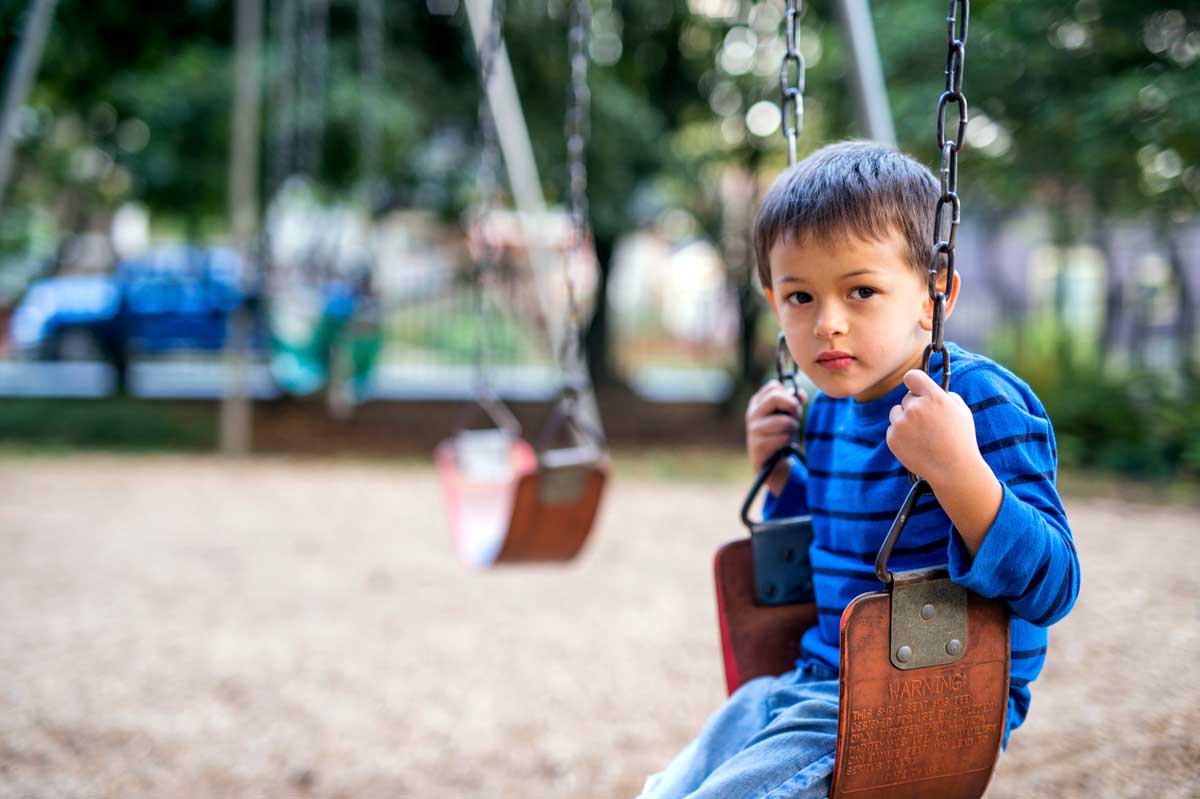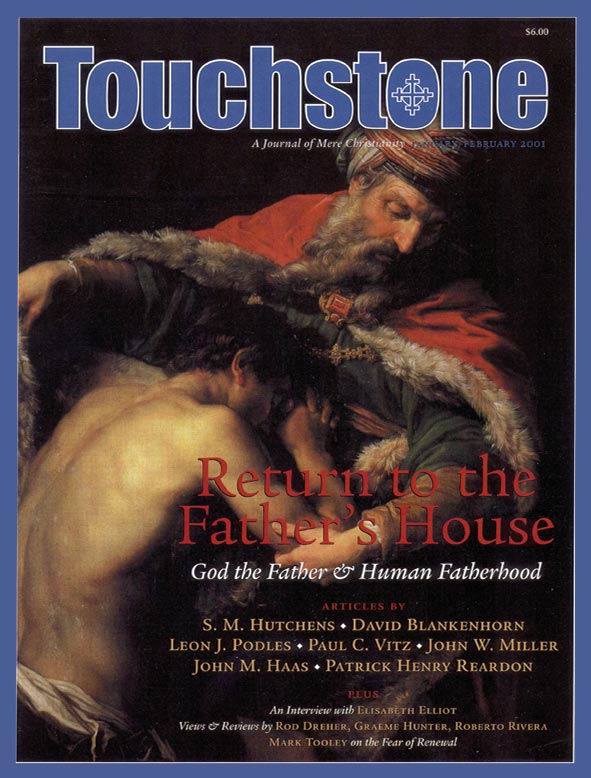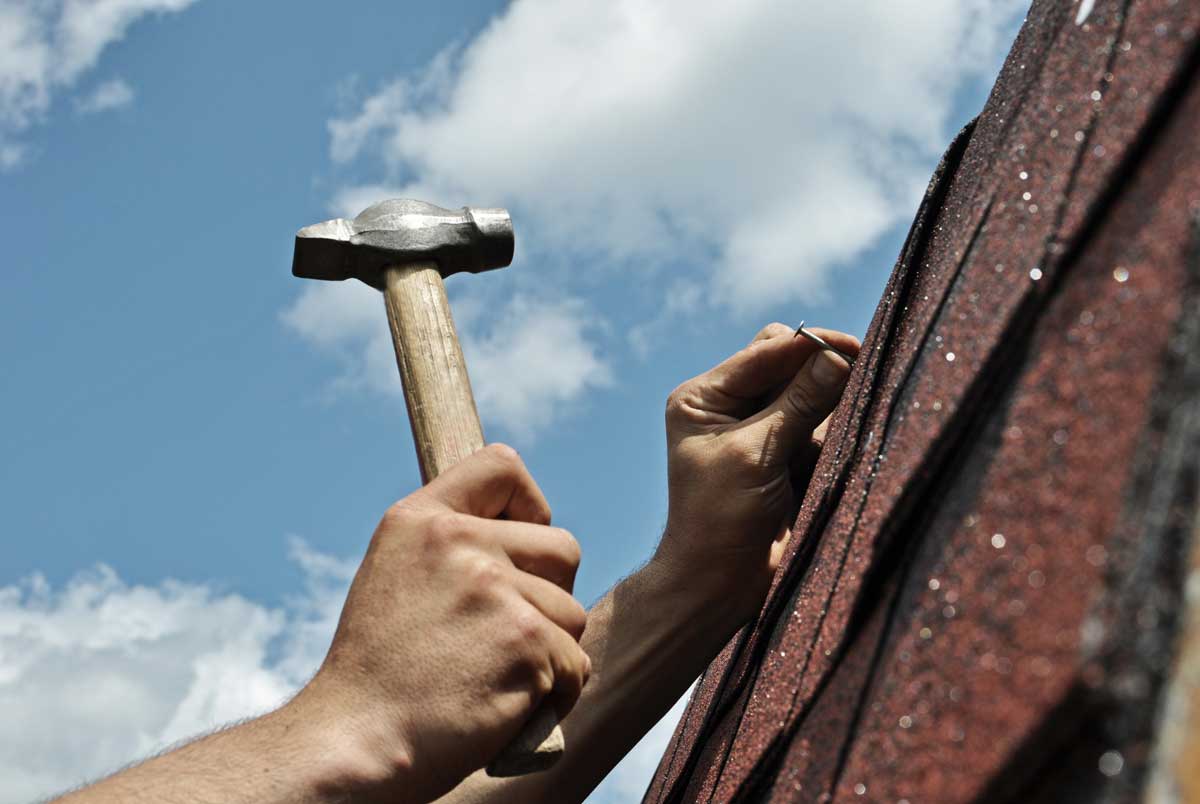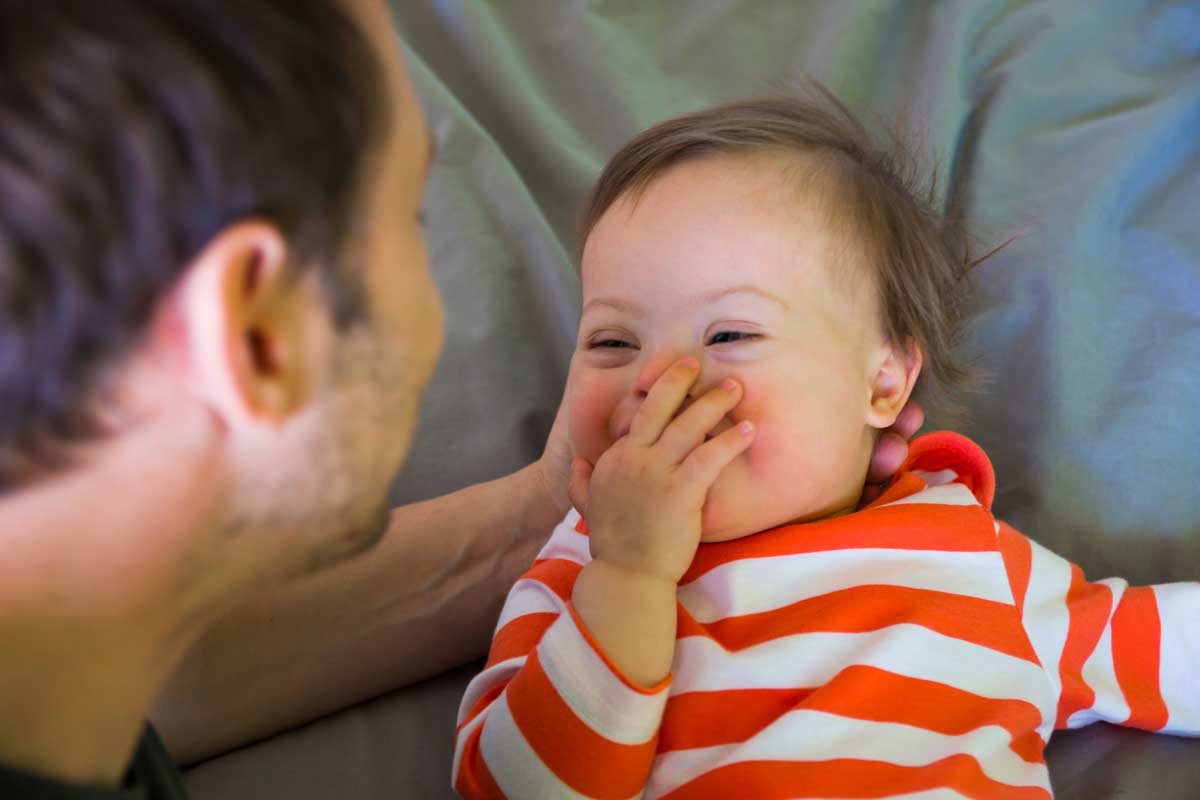Feature
Fatherhood Uprooted
A Sociologist Looks at Fatherlessness & Its Causes
by David Blankenhorn
I would like to enter the vast subject of the relationship between human and divine fatherhood by using the images of foliage and roots. Foliage is what grows above the ground, the blossoms and flowerings that are easy to see, colorful, diverse, and able to be photographed nicely. The roots are under the surface but are fundamental and the source from which the foliage grows.
The modern debate in the United States about the status of fathers really emerged in the early to mid-1990s, and it has been largely focused on the foliage, the sociological crisis of fathers. Yet with a very few but important developments in recent years, I see the discussion shifting more in the direction of roots, which are the spiritual dimensions of fatherhood and the spiritual sources of contemporary father absence.
Haves and Have-Nots
First, the foliage. The main facts are well known. Forty percent of the children in this country tonight will go to sleep in homes in which their fathers do not live. Before they reach the age of 18, more than half of all American children are likely to spend at least a significant part of their childhood living apart from their fathers. This situation is historically unprecedented. This generation is entering new territory, because never before in the history of this country—never before in the history of any country—have this many men been separated from the lives of their children and estranged from the mothers of their children.
Our society’s high rate of absent fathers stems in part from the fact that we have the highest divorce rate in the world. More than half of all marriages involving minor children end in divorce. Second, one of every three babies born in the United States is born to a never-married mother. This tendency is now spreading across lines of race and income. It’s growing fastest among older white women with at least one year of college education. So here is the foliage, some fruit, that we are seeing in our society.
This trend of fatherlessness is the main cause of the deteriorating well-being of children today; this is what the scholars are telling us. Childhood is becoming a harder, more difficult experience for so many of our children, despite the fact that the economy is roaring along. As childhood is becoming more difficult, the problems that children are suffering are becoming more acute. So many children are suffering in ways that are alarming. The scholars tell us that this massive defection of the fathers is at the heart of the deterioration of the well-being of children in our society.
They also tell us that this trend of father absence is the engine that’s driving our worst social problems. If you look at crime, teen pregnancy, children in poverty, domestic violence against women, and child abuse and neglect, what the scholars are telling us is that these problems are not isolated ills. There is an underlying force that is driving the increase of these problems and that underlying trend is this unprecedented spread of father absence. It is almost as if someone had divided the country in half and said, “Let’s put all those children who are going to live with their fathers until they reach age 18 here, on one side of the Mississippi River. And on the other side we’ll put all of the children who will not be living with their fathers through their 18th birthday.” The two sides would be roughly equal in numbers, and the country would be divided in two.
I believe that in our society, in the first few decades of this new century, the principal dividing line between the haves and the have-nots will not be what color you are, what language you speak, to what religion you belong, or where you live. It will be a question of patrimony. Which of us had fathers, and, therefore, which of us received the kind of advantage in life that comes with having a father who loves you and cares about you and cares about your mother? Which half of us, of the next generation of adults, will not have had that? That’s the foliage. That’s the sociology of what we’re seeing today.
Fathers & Sons
An indication of this growing dichotomy can be seen in the recent decline of the crime rate. One of the reasons it has gone down is that we lock up so many of our young men. Everywhere—it doesn’t matter whether you’re a liberal Democratic governor or a conservative Republican governor—the main spending program we have for our young men across the country is prison construction. We lock them up as fast as we can: as fast as we can build the prisons—that’s how fast we fill them with our young men.
Which young men are we putting in prison? The scholars have tried to investigate this and some have said, “Well, maybe it’s a race issue. It’s the black guys that we lock up because of racism and discrimination.” And some people have said, “No, it’s an income issue. If you’re poor, that puts you at risk; whereas if you’re not poor, that’s going to protect you. So it’s the poor kids who get in trouble with the police and end up in jail.” Other academics have done studies and tried to say, “Look, maybe it’s education. If you’ve graduated from high school, that is more likely to send you on the right trail and keep you out of trouble; whereas if you drop out of high school, that puts you at risk of being with the wrong people, doing the wrong things, and ending up in prison.” And other studies have looked at the issue of neighborhood, where you live. If you live in a rundown neighborhood full of drugs, guns, and gangs, it makes sense that that would be a risk factor for a young man; whereas if you’re in a more benign neighborhood, you’re less likely to get in trouble.
And yes, it’s true that all of these things matter. But one of the principal social science findings of the past decade is that it’s the presence or absence of a father in the home that is the single most important predictor of outcomes for that young man regarding getting in trouble with the police, getting arrested, and going to jail. More important than his skin color, whether he graduated from high school, how much money his family has, or where he lives is whether or not there’s a father in the home.
And why would that be? We know from the work of psychologists that there comes a time in the life of each young male in which he needs to separate psychologically from his mother to find out the meaning of his masculinity—what it means that he’s embodied as a male. The great gift of the father is his ability to help the son find out what it means to be a man. It’s as if he knights his son: “You’re man enough for me. I knight you a man. You want to be a strong man? Good, I want you to be. You’re my son. Being a strong man means treating other people right, it means taking other people’s needs into account, and it means treating women right.” So the sense of male purposiveness and male strength is directed into being protective of others. This is the great gift of the father. This is the way the father can help the boy understand the meaning of his masculinity. And I mean no disrespect to mothers by saying that the best mother in the world cannot teach her son this as well as the father, the same-sex parent, can.
Unfathered or poorly fathered boys have to go on this same search for the meaning of their masculinity. But where do they get the answers, if they don’t get them from their fathers? They get them from the street and from the Arnold Schwarzenegger movies filled with violence and male omnipotence, whose heroes go to bed with 50 women per movie. These influence the young boys, who then say, “I’m a man because I’ll hurt you if you look at me the wrong way.” And “I’m a man because I sleep with my girlfriends and some of them have my babies. And that makes me a man.”
I’ve traveled around the country in recent years and have seen some of the programs that work with these young men. Do you know what these young guys often say? “I’m a man. Treat me like a man.” I think of it as a kind of cry. I’ve also come to think of it as a kind of prayer. They don’t have a father to tell them or to help them know what it means to be a man. It’s a tragedy for our society. So many of our young men are lost in this way. And they’re the ones we’re locking up and sending to jail. That’s why we’re building the prisons, because we’re calling upon the prisons to do what the fathers aren’t there to do anymore.
Lost Daughters
People say, “Well, this fatherhood business is especially important for the boys.” That’s not right, because fatherhood is just as important for daughters. Ten percent of the babies born in this country are born to unmarried teenage girls. Who are these girls? If you look at the studies that have been done, what’s the risk factor? What’s the risk factor for early sexual activity, for having a baby outside of marriage, for getting a divorce if you do get married? And lastly, what causes these women to tell the researchers that they’re unhappy in their sexual relationships? The most important predictor of those outcomes is father absence. It’s more important than all of the other variables.
Why is this? Consider who’s the first man in every girl’s life. Who’s the first man whom she wants to love and to be loved by? It’s her father. And so the great gift of the father to his daughter is the sense of love-worthiness, the sense of esteem and confidence in her own femininity. She can say, “I can love a man and a man can love me because I’ve been loved by the first man in my life, and I have seen that man love my mother.”
The unfathered girls, or the poorly fathered girls, have a much greater risk of engaging in a kind of anxious search for male approval because they think, “Well, I’ll sleep with my boyfriend. I’ll have his baby.” Why? Because she is searching anxiously for that male approval that she didn’t get from the first man in her life.
So if you have a society where the men lay down their tools when it comes to fatherhood, and forty to fifty percent of them are going to be off the job, so to speak, you’re going to have a society that builds more and more prisons and has more and more welfare offices and social workers and court-appointed psychologists. The whole gamut of society’s efforts has to come in after the fact and try to address some of the damage that’s been done. This is part of the foliage, the flowering, that we see.
A Lost Idea of Fatherhood
In the last third of this past century, we’re not just losing our fathers; we’re losing our idea of fatherhood. We’re losing our belief that fathers are necessary. We’re losing our conviction about what a father is. This is even more troubling than the loss of fathers. In other words, what has changed most is our minds.
Sociologically speaking, the question is a very simple one: Do children need fathers? My generation, our generation, has answered that question. Our answer is: not necessarily. It’s all too complicated. Maybe it will be okay if the single mothers get enough support. Maybe it will be okay if the fathers will just send in some child-support payments and maybe visit on the weekend. Maybe it will be okay if we can get some mentors and Big Brother programs to reach out to some of these fatherless kids. It’s not necessarily imperative to commit ourselves to in-the-home, love-the-mother fatherhood for all, or even most, of our children. This is the answer we’ve given. We’ve voted with our feet and with our minds, and that’s what we say.
I was in Indiana some time ago, speaking to some high-school kids. They were middle-class, all white, two cars in the garage, rural, growing corn, Norman Rockwell America. Twenty percent of the graduating class girls were either pregnant or had become mothers in the past year. The grown-ups were alarmed. Wouldn’t you be if it was true in your high school? So, I’m there, in my business suit, to talk to these kids. I gave them my little talk, and then they just took my head right off.
I’ve thought about one girl in particular many times since then. She stood up and pointed her finger at me, not angrily, but in a very poised way. She pointed her finger at me and told me that what I was saying was wrong. What I had said was, “Mothers need husbands, grown-up men, not these boys. What are you doing?” They didn’t like that. So she told me that I was all wrong. She said, “You know, I’m a mother, and I get a lot of support from my classmates and my teachers.” And then she said, “My baby gets everything he needs from me.” And all the students cheered for her because she was popular and smart, and that’s what she believed: that her baby got everything he needed from her.
That’s a common view among younger people, and it tells us something about what we’ve done by way of passing on a marriage culture to the next generation. So we’re losing our idea of fatherhood. We’re changing our minds about whether we even know what fatherhood is and why it matters.
I wrote a book on this topic several years ago [Fatherless America]. I’m very proud to be a participant in a fatherhood movement in this country. I travel the country as a kind of jukebox on this topic. The message of the fatherhood movement is that children deserve their fathers. It’s a simple message, and once you say it, some people listen. That’s the sociology of it. But that’s only the foliage.
A Rumor of Fatherhood
Let’s talk about roots. In talking about the spiritual dimension of fatherhood and the spiritual roots of contemporary father absence, at least initially, I don’t want to argue in a way that requires you to agree with me about the Bible or agree with me about my particular religious faith. I don’t want to argue in a way that presupposes some division between faith and reason. I want initially to say something that is based on empirical observations about human fathers and what they do.
First, a question. Why do fatherless children need and love their fathers? That children would love fathers who first love and care for them is surely not surprising. But what about children who have never known their fathers? Or children whose only contact with their biological fathers has been unstable, destructive, abusive, or characterized by neglect? One of the most startling, and largely unexplained, findings of clinical researchers is that these fatherless children deeply love and want their fathers. The clinical psychologist Judith Wallerstein reports that these children experience the absence of the father as psychologically “intolerable,” leading to profound “distress,” even if the fathers in question are “ne’er-do-wells who have abandoned them without a backward glance.”
Why do these children cry for a father who is not seen or known? Why, for example, do they so often tell their mothers to “bring me my father”? Why do they typically create imaginary fathers in their minds—good fathers, fathers who are strong and kind, fathers who love them and miss them and would certainly be with them today, taking care of them, if only they could? Researchers report that these imaginary fathers are quite important to the mental health of young fatherless children.
What are we seeing here? Some of it might be explained as a primal fear of abandonment. Some of it might be that these fatherless children feel less safe, less protected, when they realize that they do not have a father. Surely some of it stems from questions of gender identity and embodiment (What do male and female mean?) and the related question of origins (Where did I come from?). But I am not sure that anyone has fully explained what these children are crying for. These are children who have never experienced a father’s love and who know little or nothing of what it means to be fathered. Perhaps these children are drawing our attention to something about ourselves that might properly be called mysterious.
For it appears to me, based on this evidence, that the human child is “meant” or intended for something called fatherhood: a fatherhood that is knowable, even to very young children who have never personally known it; a fatherhood that is larger than the actual biological father in question; and indeed, a fatherhood that appears to have little to do with whether the “real” father is absent or present, loving or neglectful, nurturing or abusive. My suspicion is that these facts add up to a sign of transcendence, or what Peter Berger calls a “rumor of angels”: an indicator from everyday life suggesting that the relationship between father and child points to something larger than itself, something that probably can be conceived of only in spiritual terms, as part of our intrinsic connectedness to one another and to God.
A Liberation That Deforms
The essential mystery is that something absent seems nevertheless to point to something powerfully present. Scholars now tell us that a man’s understanding of his fatherhood—his values and decisions regarding biological fatherhood—powerfully shapes his entire life. In this sense, for men, the act of procreation appears to be a moment of truth, a personal transformation that predicts and even guides his subsequent life course in areas as basic and diverse as employment and income, education, health, sexual and marital fulfillment, community involvement, and personal happiness.
It is certainly not surprising that the commitment to love and nurture a child, especially in the context of marriage to the mother, would substantially transform a man’s life, almost always for the better. But what of men who father children biologically but refuse that commitment? In particular, what of men who impregnate girlfriends or acquaintances, but do not marry the mothers, never reside with mother and child, and demonstrate little or no intention or capacity to care for and nurture their offspring? What happens to them? Don’t they just move on, leaving mother and child behind, remaining single men and, for better or worse, pretty much the same as before?
That’s what most scholars have assumed. That’s what the culture suggests and probably what most people believe. But it’s not true. The refusal to be nurturing fathers, according to some scholars, seems to deform men, seemingly out of all proportion, and often in ways that have little to do directly with fatherhood itself. For example, even after controlling for what scholars call “selection effects”—in this case, the likelihood that capable fathers also tend to be capable in other spheres of life—Stephen Nock, the author of Marriage and Men’s Lives, finds that men who fail at fatherhood typically become, by virtue of that failure alone, generally and significantly more unhappy, unsuccessful, “at-risk” men.
What are we seeing here? We usually think of refusing a burden—and certainly raising a child is a heavy responsibility—as a way of lightening one’s load, a strategy for attaining an increase in personal freedom. But in the case of these effectively childless fathers, refusing this particular burden paradoxically becomes their defining burden, a liberation that weighs these men down and weakens them, often for the rest of their lives. It’s as if cutting themselves off from their fatherhood were a form of self-mutilation, a denial of something essential within them, even if they themselves do not know or even care what it is.
Exactly as in the case of the children left behind, fatherhood for these men who abandon their children seems to be, at least in part, larger than itself, pointing toward an independent reality. Even in the absence of any father-child bond, fatherhood emerges as something that rises up and asserts itself, for good or ill, no matter what.
A Transforming Spiritual Calling
Perhaps we ought to think of fatherhood fundamentally as a spiritual calling, or what the novelist Herbert Gold calls “a metaphysical idea.” Anthropologists define fatherhood as a social role that obligates men to their biological offspring. It is surely society’s most important role for men. More than any other male activity, committed fatherhood helps men to become good men: more likely to obey the law, to become good citizens, to think about the needs of others, and to direct their aggression toward socially useful purposes. Just as the refusal of fatherhood deforms men, scholars such as Stephen Nock, Linda Waite, and John Snarey report that the acceptance of nurturing fatherhood fundamentally elevates and enhances virtually all aspects of men’s lives.
Regarding child and social well-being, the same themes emerge. On-the-job fathers play a necessary and largely irreplaceable role in shaping the competence and character of their children and in fostering a more civil society. From a social perspective, the most important consequences of the spread of fatherlessness are rising male violence and declining child well-being. The main social benefits of committed fatherhood are right-doing males and improved child well-being.
But here we encounter a basic paradox. Yes, good fathers are essential. And yes, men surely possess the capacity to care for their children. But in several respects adult males are poorly suited to responsible fatherhood. Compared to women, men are significantly more inclined toward sexual promiscuity, aggression, and parental abuse and neglect.
In most cases, responsible motherhood can be assumed, but not responsible fatherhood. In no human society do large numbers of mothers abandon their children. But in some societies—ours is one of them—shockingly large numbers of men do abandon their children.
Clearly, then, fathers are not born. They must be made. Reflecting on this fact, the anthropologist Margaret Mead once observed that the supreme test of any civilization is whether it can teach its men to be good fathers. For true fatherhood is not necessarily a predictable or even likely result of male sexual embodiment. Instead, it is a fragile creation of cultural norms, or what might be called a society’s story or image of fatherhood.
We must therefore closely examine this connection between paternal frailty—biological fathers who are often flawed and shortsighted, and a father-child bond that is typically weaker than the mother-child bond—and the need for an image or ideal form of fatherhood that can help teach men to be good fathers. Fatherhood is a “metaphysical idea” precisely insofar as it depends, much more than motherhood, on things unseen—an image of the father that is different from, and more than, immediate material reality. Fatherhood is especially dependent on norms of submission and self-giving that are usually honored by flesh-and-blood men at least as much in the breach as in the observance.
True fatherhood moralizes masculinity. It intimately connects adult males to others, greatly helping them to love at least a few others and encouraging them to put other people’s needs before their own. It guides men toward understanding certain acts of obedience and submission as acts of heroism. It fundamentally transforms aggression—what Martin Luther King, Jr., called the “drum major instinct,” or the desire to lead the parade—into servanthood, an ethic of demonstrating male strength through sacrificing for family. It accomplishes these goals largely by inverting male narcissism, or turning it outward, toward identification with an ideal image of generativity.
In short, true fatherhood seeks to teach men, in the face of considerable evidence to the contrary, that they are “taller when they bow.” I believe that such a root-and-branch moralization of male behavior can finally be understood only in spiritual terms—as potential fruit of a spiritual sensibility or calling, or perhaps even better, as grace, a spiritual gift. The core mystery of fatherhood is that a bare biological act yields such a transforming spiritual reality. Such a mystery is best understood as a calling to men to participate with God in creation.
Perfect Paternity
In conclusion, consider a highway billboard near Dallas, Texas. It reads “Who’s the Father?” and then gives the telephone number to call: “1-800-DNA-TYPE.” The idea is that mothers can call a toll-free number so that a genetics laboratory can help them identify the fathers of their children. There are at least two private companies now displaying such billboards in the United States.
These signs give us an important insight into our current cultural understanding of what a father is. They are telling us that we can answer the question, “Who’s the father?” by obtaining the results of a DNA test. Could our understanding of fatherhood possibly get any smaller?
Here are our choices. We can see fatherhood as a bare biological act, in which case, it is very small indeed—no larger than a drop of semen. Or we can see fatherhood as essentially a spiritual calling or vocation, in which case it is very large indeed, one of the largest things a man can do—indeed, one of the most important ways that a human male, even in his weakness and shortsightedness, can participate with God in creation.
And what will ultimately guide our choice? Whether we view fatherhood as fundamentally a biological act or fundamentally a spiritual vocation depends decisively on whether or not we seek to know and love God. For true human fatherhood—fatherhood that is loving and strong, consisting of the sincere gift of the self—must necessarily point beyond itself, allowing itself to become oriented toward something larger and better than the fragile human male. In this sense, true human fatherhood must always consist of what the Holy Father, when he was the playwright Karol Wojtyla, once called the “radiation” of fatherhood. That is, men must seek to let the perfect paternity of God the Father radiate through the frail man, understanding that the human father is genuinely authoritative only to the degree that he himself is under authority, recognizing himself as God’s obedient son.
David Blankenhorn, a native of Jackson, Mississippi, is founder and president of the Institute for American Values. He received his undergraduate degree in social studies from Harvard University and holds an M.A. in comparative social history from the University of Warwick in Coventry, England. He is the author of the groundbreaking book, Fatherless America (Basic Books, 1995). He lives in New York City with his wife, Raina, and their three children. This paper has been adapted from his opening address at Touchstone’s 1999 conference, “Return to the Father’s House: God the Father and Human Fatherhood.”
subscription options
Order
Print/Online Subscription

Get six issues (one year) of Touchstone PLUS full online access including pdf downloads for only $39.95. That's only $3.34 per month!
Order
Online Only
Subscription

Get a one-year full-access subscription to the Touchstone online archives for only $19.95. That's only $1.66 per month!
bulk subscriptions
Order Touchstone subscriptions in bulk and save $10 per sub! Each subscription includes 6 issues of Touchstone plus full online access to touchstonemag.com—including archives, videos, and pdf downloads of recent issues for only $29.95 each! Great for churches or study groups.
Transactions will be processed on a secure server.
more on fatherhood from the online archives
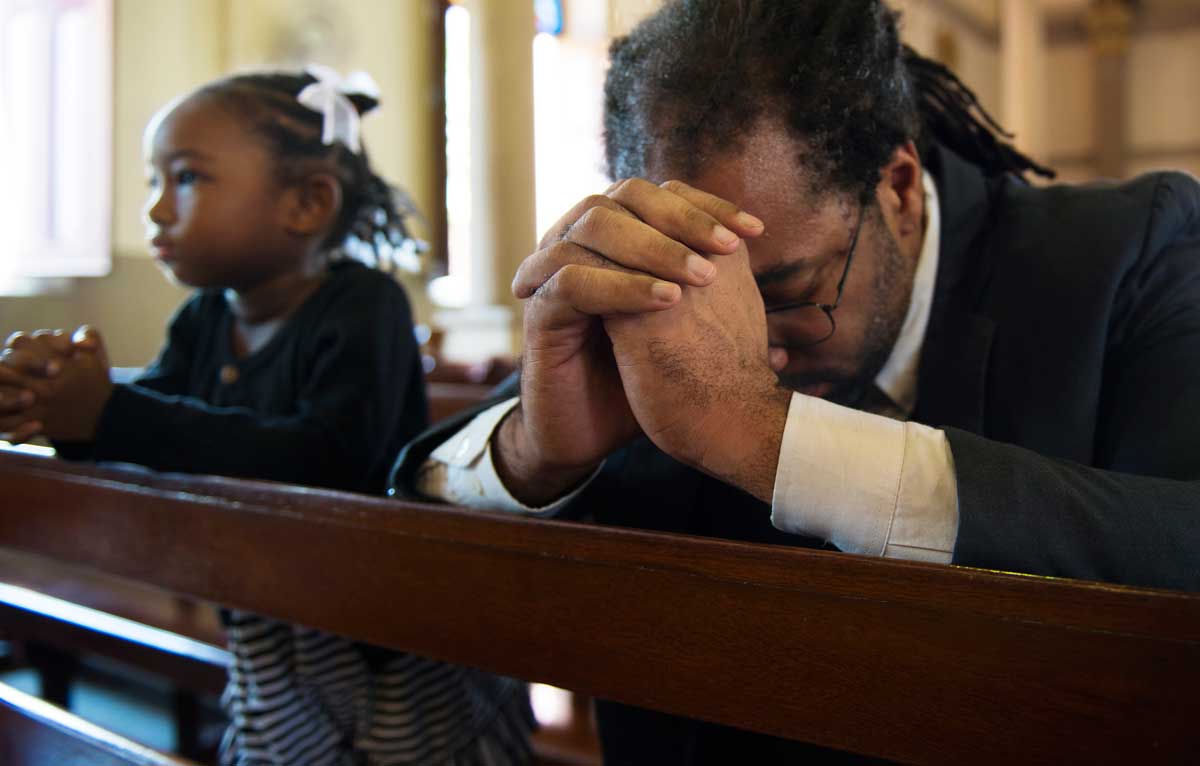
14.1—January/February 2001
The Christian Heart of Fatherhood
The Place of Marriage, Authority & Service in the Recovery of Fatherhood by John M. Haas
more from the online archives

11.5—September/October 1998
Speaking the Truths Only the Imagination May Grasp
An Essay on Myth & 'Real Life' by Stratford Caldecott
calling all readers
Please Donate
"There are magazines worth reading but few worth saving . . . Touchstone is just such a magazine."
—Alice von Hildebrand
"Here we do not concede one square millimeter of territory to falsehood, folly, contemporary sentimentality, or fashion. We speak the truth, and let God be our judge. . . . Touchstone is the one committedly Christian conservative journal."
—Anthony Esolen, Touchstone senior editor





